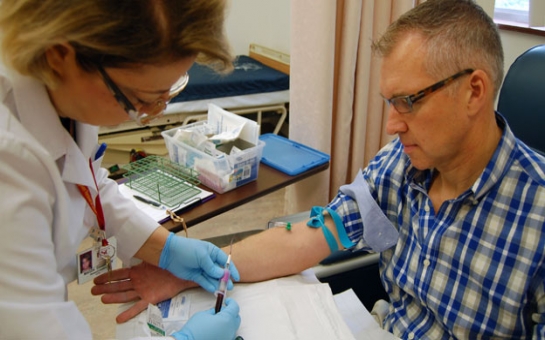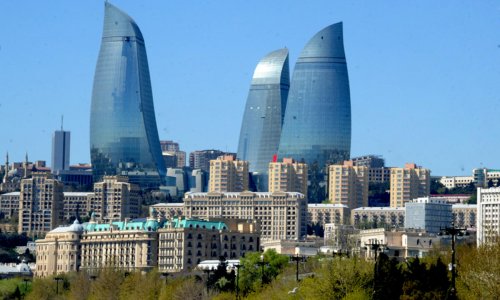By Peter Bowes
BBC News, Los Angeles
Many of the changes in my body when I took part in the clinical trial of an intermittent fasting diet, were no surprise. Eating very little for five days each month, I lost weight, and I felt hungry. I also felt more alert a lot of the time, though I tired easily. But there were other effects too that were possibly more important.
During each five-day fasting cycle, when I ate about a quarter the average person's diet, I lost between 2kg and 4kg (4.4-8.8lbs) but before the next cycle came round, 25 days of eating normally had returned me almost to my original weight.
But not all consequences of the diet faded so quickly.
"What we are seeing is the maintenance of some of the effects even when normal feeding resumes," explains Dr Valter Longo, director of USC's Longevity institute, who has observed similar results in rodents.
"That was very good news because that's exactly what we were hoping to achieve."
Clinical tests showed that during the diet cycles my systolic blood pressure dropped by about 10%, while the diastolic number remained about the same. For someone who has, at times, has borderline hypertension, this was encouraging. However, after the control period (normal diet), my blood pressure, like my weight, returned to its original - not-so-healthy - state.
The researchers will be looking at whether repeated cycles of the diet could be used to help manage blood pressure in people over the longer term.
Arguably, the most interesting changes were in the levels of a growth hormone known as IGF-1 (insulin-like growth factor). High levels of IGF-1, which is a protein produced by the liver, are believed significantly to increase the risks of colorectal, breast and prostate cancer. Low levels of IGF-1 reduce those risks.
"In animals studies we and others have shown this to be a growth factor that is very much associated with ageing and a variety of diseases, including cancer," says Longo.
Studies in mice have shown that an extreme diet, similar to the one I experienced, causes IGF-1 levels to drop and to stay down for a period after a return to normal eating.
My data showed exactly the same pattern.
"You had a dramatic drop in IGF-1, close to 60% and then once you re-fed it went up, but was still down 20%," Longo told me.
Such a reduction could make a significant difference to an individual's likelihood of developing certain cancers, he says. A study of a small population of people in Ecuador, who have much lower levels of IGF-1, because they lack a growth hormone receptor, showed that they rarely develop cancer and other age-related conditions.
My blood tests also revealed that the major inhibitor of IGF-1, which is called IGFBP-1, was significantly up during the fasting period. Even when I resumed a normal diet, the IGFBP-1 level was elevated compared with my baseline. It is, according to Longo, a sign that my body switched into a mode that was much more conducive to healthy ageing.
Data from other participants in the study is still being analysed, but if they also show lower levels of IGF-1 and higher levels of IGFBP-1, it could help scientists develop an intermittent fasting regime that allows people to eat a normal diet for the vast majority of the time, and still slow down the ageing process.
One idea being explored by Longo is that a five-day intervention every 60 days may be enough to trigger positive changes in the body.
"This is exactly what we have in mind to allow people, for let's say 55 every 60 days, to decide what they are going to eat with the help of a good doctor, and diet in the five days. They may not think it is the greatest food they have ever eaten, but it's a lot easier, let's say, than complete fasting and it's a lot safer than complete fasting and it may be more effective than complete fasting."
The very small meals I was given during the five-day fast were far from gourmet cooking, but I was glad to have something to eat. There are advocates of calorie restriction who promote complete fasting.
My blood tests also detected a significant rise in a type of cell, which may play a role in the regeneration of tissues and organs.
It is a controversial area and not fully understood by scientists.
"Your data corresponds to pre-clinical data that we got from animal models that shows that cycles of fasting could elevate this particular substance, considered to be stem cells," said Dr Min Wei, the lead investigator.
The substance has also been referred to, clumsily, as "embryonic-like".
"At least in humans we have a very limited understanding of what they do. In animal studies they are believed to be 'embryonic-like' meaning... they are the type of cells that have the ability to regenerate almost anything," says Longo.
It would be highly beneficial if intermittent fasting could trigger a response that enhances the body's ability to repair itself, but much more research is required to confirm these observations.
This diet is still at the experimental stage and data from the trial are still being studied. Other scientists will eventually scrutinise the findings independently, and may attempt to replicate them.
"We generally like to see not only an initial discovery in a trial but we like to see confirmatory trials to be sure that in the broadest kind of sense, in the general population that these findings are going to be applicable," says Dr Lawrence Piro, a cancer specialist at The Angeles Clinic and Research Institute.
"I do believe fasting to be a very effective mechanism. They are pieces of a puzzle, that puzzle is not fully revealed yet, the picture isn't clear yet but there's enough of the picture clear. I think we can be really excited that there is some substantial truth here, some substantial data coming forward and something that we can really be hopeful about."
Future clinical trials will focus on "at-risk" members of community - those who are obese - to gauge their response to a severely restricted diet.
But if this diet, or another intermittent fasting diet, is eventually proven be effective and sustainable, it could have profound implications for weight loss and the way doctors fight the diseases of old age.
ANN.Az











